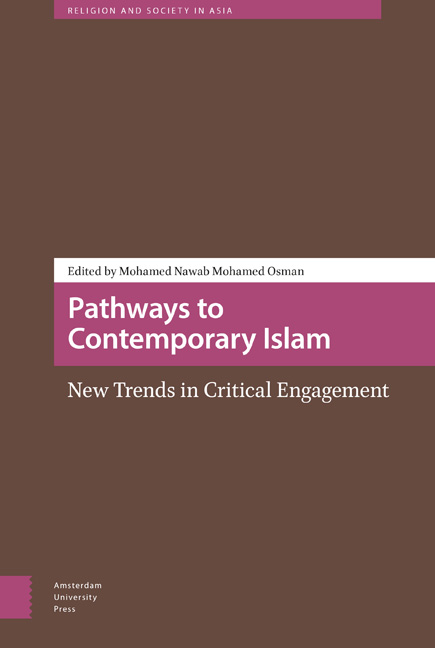Book contents
- Frontmatter
- Dedication
- Contents
- Acknowledgements
- Introduction: Constructing Pathways to Contemporary Islam
- Section 1 Historical Trends in Contemporary Perspective
- Section 2 Contesting the Islamic Intellectual Tradition
- Section 3 Beyond the Arab Revolutions: Political Islam Revised
- Section 4 Contemporary Spaces of Critical Engagement
- Notes on the Contributors
- Index
2 - A Theoretical Pathway to Contemporary Islam
Published online by Cambridge University Press: 25 November 2020
- Frontmatter
- Dedication
- Contents
- Acknowledgements
- Introduction: Constructing Pathways to Contemporary Islam
- Section 1 Historical Trends in Contemporary Perspective
- Section 2 Contesting the Islamic Intellectual Tradition
- Section 3 Beyond the Arab Revolutions: Political Islam Revised
- Section 4 Contemporary Spaces of Critical Engagement
- Notes on the Contributors
- Index
Summary
Abstract
This chapter examines the ways in which modernity was theorized in relation to Islam to analyse the historical contingency of knowledge production on Islam in Western scholarship. It critically interrogates concepts such as history, civilization, and modernity, in which Islam transitions from a timeless other to a distinctive trajectory within multiple modernities. The chapter proposes Paul Rabinow's framework of the contemporary to open up non-Orientalist and non-binary approaches to the study of Islam. Overall, the chapter stresses three theoretical propositions: a historical approach to epistemology and analytical tools; the need to recognize Muslims as active agents shaping discourses of Islam; and finally, a conceptual openness to emergent phenomena and interrelations between the traditional and the modern.
Keywords: Islam and modernity; multiple modernities; post-Orientalism; anthropology of Islam
From Herodotus to Universal History
We learn from Collingwood (1946) that before the rise of Greece, time was marked through theocratic history and myths, which were both forms of quasi-history. Herodotus’ humanistic turn in the fifth century BCE established history as a science that followed human actions, moving away from the metaphoric temporality of legends or gods. This differentiation has also been described as the contrast between ‘the achronic time of myth and the chronic time of history’. The modern understanding of history took further turns in the Renaissance and the Enlightenment traditions, which decisively shaped the perception of Islam and Muslim polities in Western imagination and discourse.
The humanistic turn established human agency as the driver of history and thus Greco-Roman historiography emphasized that historical events are caused by human agents. By the Dark Ages, Christian thought reclaimed a providential view of history as the unfolding of God's wisdom. Later on, Renaissance historians returned to the humanist tradition and postulated that the task of history is to recall and record the events of the past. With increased influence from philosophy, history started to be considered a form of knowledge rather than a concrete outline of events. Ibn Khaldun, who studied the formation of dynasties in the Maghreb of the fourteenth century and the transition from nomadic to sedentary societies, developed a critical method for the study of history.
- Type
- Chapter
- Information
- Pathways to Contemporary IslamNew Trends in Critical Engagement, pp. 49 - 74Publisher: Amsterdam University PressPrint publication year: 2020



